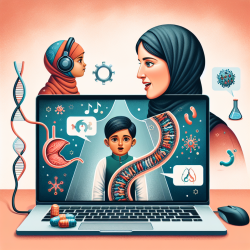Understanding the Link Between Sex Chromosome Aneuploidies and Eosinophilic Esophagitis
In the realm of pediatric healthcare, understanding the intricate connections between genetic conditions and their associated health implications is crucial. The recent research article titled Eosinophilic Esophagitis in Individuals with Sex Chromosome Aneuploidies: Clinical Presentations and Management Implications by Howell et al. sheds light on a significant association that has not been widely reported in the literature. This study provides a data-driven insight into the prevalence of eosinophilic esophagitis (EoE) in individuals with sex chromosome aneuploidies (SCAs), offering valuable implications for clinical practice.
Key Findings from the Study
The study conducted a retrospective chart review of 667 patients with SCAs at a large tertiary care center. The findings revealed that 4% of these children had a biopsy-confirmed diagnosis of EoE. This represents an odds ratio of 32, indicating a significantly higher prevalence compared to the general population. This data underscores the importance of routine screening for EoE symptoms in individuals with SCAs, particularly those with atopic conditions.
Clinical Implications for Practitioners
For practitioners, these findings highlight the need for heightened awareness and proactive management strategies. Here are some actionable steps practitioners can take:
- Routine Screening: Implement routine screening protocols for EoE symptoms in patients with SCAs, especially those exhibiting atopic conditions. Early diagnosis can lead to better management and improved outcomes.
- Interdisciplinary Approach: Collaborate with a team of specialists, including gastroenterologists, allergists, and geneticists, to provide comprehensive care for patients with SCAs and potential EoE.
- Parental Education: Educate parents about the signs and symptoms of EoE, emphasizing the importance of early intervention and the potential impact on their child's quality of life.
Encouraging Further Research
While this study provides valuable insights, it also opens the door for further research. Understanding the underlying mechanisms driving the association between SCAs and EoE could pave the way for targeted therapies and improved patient outcomes. Practitioners are encouraged to engage in research initiatives or collaborate with research institutions to explore this connection further.
Conclusion
The findings from this study underscore the importance of recognizing the potential link between SCAs and EoE. By implementing routine screenings and adopting a collaborative approach to care, practitioners can significantly enhance the quality of life for affected individuals. As we continue to unravel the complexities of genetic conditions and their health implications, data-driven decisions will remain at the forefront of improving outcomes for children.
To read the original research paper, please follow this link: Eosinophilic esophagitis in individuals with sex chromosome aneuploidies: Clinical presentations and management implications.










